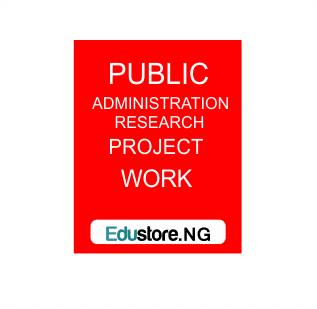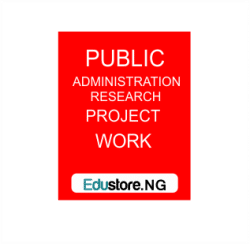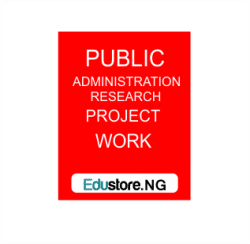Corruption in Nigeria: A Study of the Ministry of Humanitarian Affairs and Disaster Management
Abstract
This study investigated the pervasive issue of corruption within the Ministry of Humanitarian Affairs and Disaster Management in Nigeria. Employing a quantitative survey research design, data were meticulously collected from a sample comprising 120 respondents using a structured questionnaire. This approach aimed to provide a comprehensive understanding of the extent and nature of corruption within the ministry, as well as its implications on humanitarian and disaster management efforts. Leveraging the robust analytical capabilities of SPSS27, the collected data were meticulously analyzed, with particular emphasis on employing one-sample t-tests to rigorously test the hypotheses posited in the study. The findings unearthed alarming levels of corruption within the Ministry of Humanitarian Affairs and Disaster Management. Through the utilization of one-sample t-tests, the study revealed statistically significant evidence indicating that corruption significantly hampered the effectiveness of the ministry’s humanitarian and disaster management endeavours. Specifically, the data underscored the detrimental impact of corruption on the timely distribution of relief materials during crises and the misallocation of resources, thereby impeding the ministry’s capacity to respond effectively to disasters and mitigate their adverse effects. Furthermore, the analysis unveiled a culture of impunity that pervaded the ministry, perpetuating corrupt practices among its staff members. In light of these findings, the study concluded with a compelling call to action. It emphasized the urgent need for proactive measures to combat corruption within the Ministry of Humanitarian Affairs and Disaster Management. Recommendations were proposed to address the root causes of corruption and bolster transparency, accountability, and ethical governance within the ministry. These included implementing stricter accountability measures for financial transactions, conducting regular audits and investigations to identify and address instances of corruption, and enhancing transparency in decision-making processes. Additionally, the study advocated for the establishment of whistleblower protection mechanisms to encourage the reporting of corrupt activities and promote a culture of integrity and accountability.
CHAPTER ONE
INTRODUCTION
Background to the Study
Corruption remains a significant impediment to the socio-economic development of many nations, with Nigeria being a prime example (Khan, 2020). The nation’s wealth, primarily derived from its abundant natural resources, has been significantly undermined by pervasive corruption, which affects various sectors of governance and public service (Hickey & Bracking, 2021). Despite numerous anti-corruption campaigns and the establishment of agencies such as the Economic and Financial Crimes Commission (EFCC) and the Independent Corrupt Practices Commission (ICPC), corruption continues to thrive (Huntington, 2020). This study focuses on the Ministry of Humanitarian Affairs and Disaster Management, a crucial ministry responsible for addressing humanitarian crises and managing disaster response in Nigeria.
Established in August 2019, the Ministry of Humanitarian Affairs and Disaster Management was created to coordinate and streamline humanitarian efforts and disaster management in Nigeria (Gould, 2022). The ministry’s mandate includes managing the distribution of relief materials, overseeing the welfare of internally displaced persons (IDPs), and coordinating disaster response and management activities (Nye, 2023). Given its significant role, the ministry handles substantial financial resources, making it susceptible to corrupt practices.
Corruption within this ministry can manifest in various forms, including the embezzlement of funds, misallocation of resources, nepotism, and the manipulation of beneficiary lists (Heidenheimer, 2019). Such practices undermine the ministry’s effectiveness, leading to inadequate disaster response, prolonged suffering for disaster victims, and a lack of trust in government institutions (Gray & Kaufman, 2020). This study aims to explore the extent and impact of corruption within the Ministry of Humanitarian Affairs and Disaster Management, shedding light on specific cases and broader systemic issues.
To address corruption effectively, it is essential to understand its root causes and dynamics (Leff, 2020). One of the contributing factors to corruption within the ministry may be the lack of transparency and accountability in its operations (Hope & Ronald, 2020). Without adequate mechanisms for oversight and accountability, corrupt practices can flourish unchecked (Madard, 2020). Therefore, efforts to combat corruption should focus on strengthening transparency, accountability, and integrity in the ministry’s operations (Hichey & Braching, 2021).
Additionally, addressing corruption within the Ministry of Humanitarian Affairs and Disaster Management requires a multi-faceted approach (Levi & Nelken, 2020). This may involve implementing stricter regulations and oversight mechanisms to prevent corruption (Mauro, 2021). It may also entail promoting ethical leadership and fostering a culture of integrity within the ministry (McMullan, 2021). Furthermore, engaging civil society organizations and fostering citizen participation can help increase transparency and accountability (Onigu, 2020).
Ultimately, combating corruption within the Ministry of Humanitarian Affairs and Disaster Management is crucial for ensuring effective disaster response and humanitarian assistance in Nigeria (Gould & Amaro-Reyes, 2023). By addressing corruption, the ministry can better fulfil its mandate of providing timely and efficient assistance to those in need (Kaufmann, 2021). Moreover, tackling corruption within the ministry can help restore public trust and confidence in government institutions (Khan, 2020). Therefore, this study’s findings are not only pertinent for improving the ministry’s operations but also for advancing the overall development agenda in Nigeria (Harsch, 2021).
Statement of Problem
The Ministry of Humanitarian Affairs and Disaster Management plays a critical role in addressing humanitarian crises and managing disaster response in Nigeria (Nye, 2023). However, pervasive corruption within the ministry poses significant challenges to its effectiveness and the well-being of disaster-affected populations (Gray & Kaufman, 2020). Despite existing anti-corruption measures, corruption continues to undermine the ministry’s operations, resulting in misallocation of resources, embezzlement of funds, nepotism, and manipulation of beneficiary lists (Heidenheimer, 2019). These corrupt practices hinder the timely and equitable distribution of relief materials, exacerbating the suffering of disaster victims and prolonging their recovery process (Hope & Ronald, 2020).
One of the primary gaps in the current understanding of corruption within the Ministry of Humanitarian Affairs and Disaster Management is the lack of comprehensive data and analysis on the extent and nature of corrupt activities (Madard, 2020). While anecdotal evidence and occasional reports shed light on specific instances of corruption, there is a need for systematic research to identify patterns, root causes, and systemic issues contributing to corruption within the ministry (Leff, 2020). Additionally, the effectiveness of existing anti-corruption measures and oversight mechanisms within the ministry remains unclear (Hickey & Bracking, 2021). Without a thorough understanding of these issues, efforts to combat corruption are likely to be ineffective and insufficient (Khan, 2020).
Furthermore, the impact of corruption within the Ministry of Humanitarian Affairs and Disaster Management on vulnerable populations, such as internally displaced persons (IDPs), requires closer examination (Huntington, 2020). Limited access to essential services and resources due to corrupt practices exacerbates the vulnerabilities of IDPs and undermines their rights to dignity and assistance (Harsch, 2021). Moreover, the erosion of public trust in government institutions due to corruption poses broader challenges to governance and democracy in Nigeria (Mauro, 2021). Therefore, there is a pressing need for research that not only identifies gaps in the current anti-corruption framework but also explores innovative approaches to strengthen transparency, accountability, and integrity within the ministry (Gould & Amaro-Reyes, 2023).
Objectives of the Study
The objectives of this study were:
- To examine the extent and nature of corruption within the Ministry of Humanitarian Affairs and Disaster Management.
- To assess the impact of corruption on the effectiveness of the ministry’s humanitarian and disaster management efforts.
- To identify and evaluate strategies that could mitigate corruption within the ministry.
Research Questions
This study aimed to answer the following research questions:
- What is the extent and nature of corruption within the Ministry of Humanitarian Affairs and Disaster Management?
- How does corruption affect the effectiveness of the ministry’s humanitarian and disaster management efforts?
- What strategies can be identified and evaluated to mitigate corruption within the ministry?
Research Hypotheses
To guide this study, the following hypotheses were formulated:
- There is no significant level of corruption within the Ministry of Humanitarian Affairs and Disaster Management.
- Corruption does not significantly impair the effectiveness of the ministry’s humanitarian and disaster management efforts.
- Implementing targeted anti-corruption strategies can not significantly reduce the incidence of corruption within the ministry.
Significance of the Study
The significance of this study on corruption within the Ministry of Humanitarian Affairs and Disaster Management in Nigeria extends beyond academic inquiry; it holds profound implications for governance, public welfare, and socio-economic development.
Firstly, the findings of this study have direct policy implications. By shedding light on the extent and nature of corruption within the ministry, policymakers can formulate targeted and effective anti-corruption strategies. Strengthening transparency and accountability mechanisms within the ministry can enhance the effectiveness of disaster response and humanitarian efforts, ensuring that aid reaches those in need promptly and equitably. Moreover, implementing robust oversight mechanisms can help prevent corrupt practices and restore public trust in government institutions.
Secondly, this study contributes to improving the efficiency and impact of humanitarian efforts in Nigeria. By identifying the factors that hinder the effective distribution of aid and disaster response, the study provides insights that can inform reforms and improvements in the delivery of humanitarian assistance. Addressing corruption within the ministry is crucial for ensuring that resources are allocated efficiently and equitably, thereby maximizing the benefits for disaster-affected populations.
Furthermore, this study adds to the existing body of knowledge on corruption in Nigeria, particularly within the context of humanitarian affairs and disaster management. By providing empirical evidence and analysis, the study contributes to a deeper understanding of the dynamics of corruption and its impact on governance and development in the country. It serves as a reference for policymakers, researchers, and practitioners working in the field of anti-corruption and governance reform.
Moreover, raising awareness about the challenges posed by corruption within the Ministry of Humanitarian Affairs and Disaster Management can mobilize public support for anti-corruption initiatives. Increased awareness can lead to greater scrutiny of government actions and increased pressure on officials to adhere to ethical standards. In this way, the study can contribute to fostering a culture of integrity and accountability within the broader society.
Overall, the significance of this study lies in its potential to inform policy, improve humanitarian efforts, advance knowledge, and promote transparency and accountability in governance. By addressing corruption within the Ministry of Humanitarian Affairs and Disaster Management, the study aims to contribute to the broader goal of fostering sustainable development and ensuring the well-being of all Nigerians.
Scope of the Study
The scope of this study was focused on the Ministry of Humanitarian Affairs and Disaster Management in Nigeria, examining the extent and impact of corruption within this specific ministry. The study covered a period from the ministry’s inception in 2019 to 2023, providing a recent and relevant analysis of its operations and challenges. It involved qualitative and quantitative methods, including interviews with key stakeholders, analysis of financial records, and case studies of specific instances of corruption.
Operational Definition of Terms
For clarity and precision, the following terms are defined as used in this study:
Corruption: The abuse of entrusted power for private gain. This includes bribery, embezzlement, nepotism, and fraud.
Humanitarian Affairs: Activities and policies related to providing aid and relief to individuals and communities in need, particularly in crises.
Disaster Management: The organization and management of resources and responsibilities for dealing with all humanitarian aspects of emergencies, in particular preparedness, response, and recovery to lessen the impact of disasters.
Internally Displaced Persons (IDPs): Individuals who have been forced to flee their homes but remain within their country’s borders, often due to conflict, violence, or disasters.
Misappropriation of Funds: The illegal use of funds by someone who controls those funds, such as diverting them for personal use rather than for their intended purpose.
Fraudulent Contracting: The act of deceitfully obtaining contracts through misrepresentation, bribery, or other corrupt practices.
Nepotism: Favoritism granted to relatives or close friends by those in power, often by giving them jobs or other advantages.
Transparency: The quality of being open and honest; in the context of government, it refers to the extent to which citizens can observe and understand government decision-making and processes.
References
- Gould, D. J., & Amaro-Reyes, J. (2023). The effects of corruption on administrative performance: Illustrations from developing countries (World Bank Working Paper No. 580).
- Gould, J. (2022). Contesting democracy: The 1996 elections in Zambia. In M. Cowen & L. Laakso (Eds.), Multi-party elections in Africa. Oxford: James Currey.
- Gray, C. W., & Kaufman, D. (2020). Corruption and development. Finance and Development, 35, 7-10.
- Gray, D. E. (2018). Doing Research in the Real World. London: Sage.
- Harsch, E. (2021). Accumulators and democrats: Challenging state corruption in Africa. Journal of Modern African Studies, 31(1), 31-48.
- For Reference Only: Materials are for research, citation, and idea generation purposes and not for submission as your original final year project work.
- Avoid Plagiarism: Do not copy or submit this content as your own project. Doing so may result in academic consequences.
- Use as a Framework: This complete project research material should guide the development of your own final year project work.
- Academic Access: This platform is designed to reduce the stress of visiting school libraries by providing easy access to research materials.
- Institutional Support: Tertiary institutions encourage the review of previous academic works such as journals and theses.
- Open Education: The site is maintained through paid subscriptions to continue offering open access educational resources.





